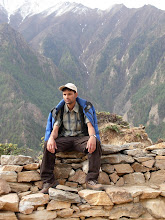KATHMANDU, NOV 03 - Despite attention on the Polar Regions as hot-spots of climate change, the effects of global warming on the Himalayas have largely been ignored. The melting of the Himalayas, which hold about 0.77 percent of the total snow in the world, goes largely neglected, even though billions of people living in the region are highly vulnerable to the impacts of climate change.
“The effects of climate change on countries like Bangladesh and Maldives are now well known; however, there is little international awareness about the vulnerability of the Himalayas posed by the same cause,” said Deepak Bohora, Minister for Forest and Soul Conservation on Monday.
Furthering this message will be 2,000 mountaineers who have scaled Mt. Everest and will come together on Dec. 11, International Mountain Day, at the Copenhagen Climate Summit to raise awareness on impacts of climate change in the Himalayas.
The campaign, named Summiteers’ Summit and led by mountaineer Appa Sherpa, will help draw interest of world leaders on the serious impact of global warming phenomena such as faster retreat of glaciers and their bursting, along with vulnerabilities of the people living in the Himalayas.
Sherpa, who successfully climbed Everest for the record 19th time this year said, “The snow levels are decreasing significantly. I saw water at 8,000 m this year, which is very uncommon in the Everest region.”
Meanwhile, explaining another instance of climate change in the region, Appa said locals of Dingboche in Solukhumbu district are not interested in building any new infrastructure including schools, hospitals and houses, due to fears of glacial lake outbursts.
Summiteer Pemba Dorje Sherpa, record-holder for the fastest ascent of Everest, said, climbing Everest was much easier this year compared with previous years. “We can climb comfortably with normal shoes up to 7,000 m. There are more rocky parts compared with snow-covered areas on the way to the summit,” he said.
Pemba agreed with Apa about the presence of water at higher altitudes than before. “Earlier, we had to melt the ice to drink water. However, water is now easily found without having to heat the ice,” he said.
The government has said it will lead the role to draw global attention about climate change impacts in the Himalayas especially towards Mt. Everest in the 15th Conference of Parties of United Nation’s Framework of Climate Change (UNFCC) to be held at Copenhagen, Denmark, this December.
Minister Bohora also said that the government will invite Bill Clinton and Al Gore, former U.S. president and vice-president, among other world leaders to lead the summiteers in Copenhagen.This year’s Copenhagen summit of climate change is viewed as a crucial meeting of all the meetings of the UNFCC. The summit has been billed as a final opportunity for the world to seal a deal to prevent climate change’s catastrophic impacts and help poor countries like Nepal to adapt to the phenomenon.



No comments:
Post a Comment